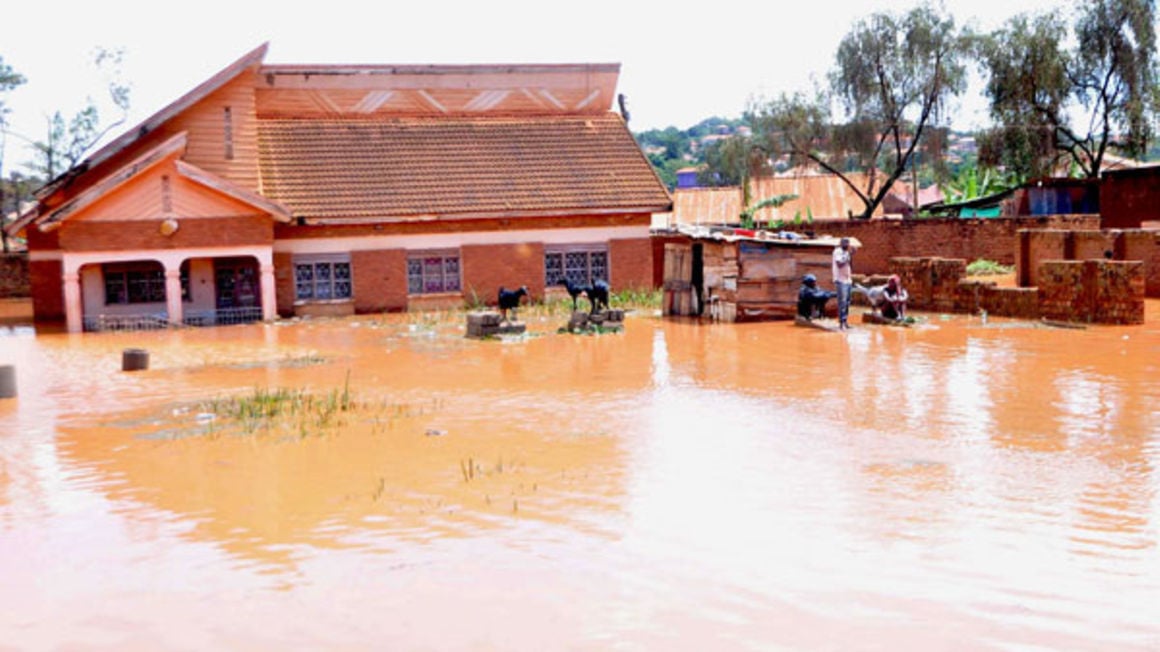Prime
Govt sector budget fails to tackle climate change - report

Livestock and residents stranded in a flooded area in Lufuuka Zone in Ndejje Namasuba following a heavy downpour recently. PHOTO/FILE
What you need to know:
Dr Callist Tindimugaya, the commissioner for Water Resources Planning and Regulations, said a policy to address flooding is being developed. It involves the protection and restoration of natural resources. He said an inter-ministerial committee chaired by the Prime minister is set to present to Cabinet the draft policy by the end of this month.
Many government sectors are not budgeting for interventions against climate change despite the increase in natural disasters in the country, an assessment report by the National Planning Authority (NPA) indicates.
The findings were revealed at the national dialogue on climate resilience in Kampala yesterday under the theme: ‘Enhancing Climate Resilience Through integrating Climate Change in Planning, Programming and Budgeting’.
Dr Arthur Bainomugisha, the executive director of Advocates Coalition for Development and Environment, called for a robust legal framework to enforce the implementation of climate change interventions.
Experts have been calling for inclusion of climate change interventions in the national budget While releasing the results, Mr Ronald Kaggwa, the manager in charge of production, trade and tourism planning at NPA, said whereas some progress has been made on planning, there is minimal compliance at budgeting and execution.
“There are no specific budget allocations for climate change interventions. Thirty-five per cent was the average score for all sectors. The highest score was 78 per cent while some sectors scored zero per cent,” Mr Kaggwa said.
The sectors assessed in the 2020/2021 budget include health, education, water and environment, transport, agriculture, tourism, local government, housing and urban development.
The assessment was based on interventions highlighted in the NPA III, including increasing forest and wetland coverage, building capacity for climate change adaptation and mitigation, among others.
Mr Kaggwa said the laxity to incorporate climate change in sector budgets is due to the lack of appreciation on how climate change impacts the outcomes of sector plans and development.
Uganda has seen an increase in climate and weather-related shocks such as floods ravaging Ntoroko and Buliisa districts, landslides in the Elgon region, rise in the water levels of Lake Victoria and Lake Kyoga, erratic and reduced rainfall among others.
Experts say the need to inculcate interventions against climate change in budgeting and building resilience has become imperative, as the country is experiencing more weather-related disasters.
Dr Stephen Muwaya, the project coordinator in charge of enhancing resilience of agriculture landscapes at the Ministry of Agriculture, said the sector is the most vulnerable, yet the most depended-on in the country.
He said between 2000 and 2013, approximately $900m (about Shs3.3 trillion) was lost due to climate-related issues.
“Twenty-four per cent of the GDP is from agriculture and, therefore, drought will significantly affect the economy. There is a need to ensure that policies respond to the risks we face from climate change and attract the necessary financing,”Dr Muwaya said.
“Climate change requires multi-interventions, we need to promote the use of renewable energy, climate smart agriculture that optimises water use, uses sustainable land use practices, and promotes agro forestry,” he said.
Mr Bob Natifu, the acting commissioner in the climate department, said although Uganda’s contribution to greenhouse gases is negligible, the country is very vulnerable to the vagaries of climate change and thus the need to focus on adaptation.
He said the ministry is focusing on nature-based solutions such as increasing the forest cover, wetland protection and embracing renewable energy.



